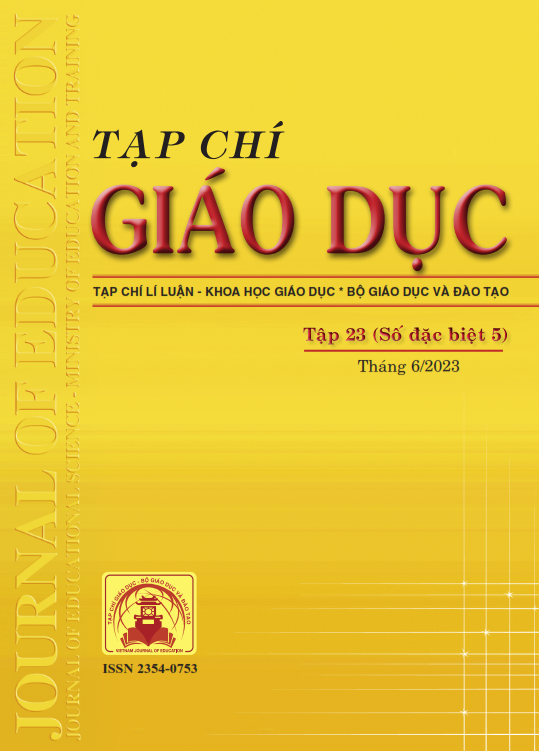Tổ chức dạy học theo mô hình STSE nhằm bồi dưỡng năng lực giải quyết vấn đề của phát triển bền vững ở học sinh
Tóm tắt
Education for sustainable development is like a new wind blowing into global education, creating major systemic changes in world perception and education model. Physics has many opportunities to implement sustainable development education for learners, helping them to perceive and understand the interrelationships between humans and the surrounding natural and social environment. The STSE (Science, Technology, Society and Environment) model is one of the approaches to meet sustainable development goals. STSE puts science and technology in the context of society and the living environment, contributing to the formation of behavior, awareness and competence to implement specific solutions in sustainable development. The article proposes a teaching process following the STSE approach and applying it to the teaching topic “Renewable energy”. The analysis of some results obtained with 10th graders at Hong Quang High School (Hai Duong) initially shows the effectiveness of the teaching process with the goal of fostering problem-solving competence of sustainable development in students.
Tài liệu tham khảo
Bộ GD-ĐT (2018a). Chương trình Giáo dục phổ thông - Chương trình tổng thể (ban hành kèm theo Thông tư số 32/2018/TT-BGDĐT ngày 26/12/2018 của Bộ trưởng Bộ GD-ĐT).
Bộ GD-ĐT (2018b). Chương trình giáo dục phổ thông môn Vật lí (ban hành kèm theo Thông tư số 32/2018/TT-BGDĐT ngày 26/12/2018 của Bộ trưởng Bộ GD-ĐT).
Đỗ Hương Trà (chủ biên, 2019). Dạy học phát triển năng lực môn Vật lí trung học phổ thông. NXB Đại học Sư phạm.
Vương Thị Ngọc Loan, Trần Thị Gái, Kiều Thị Kính (2020). Quy trình tích hợp giáo dục phát triển bền vững thông qua hoạt động trải nghiệm trong học phần “Môi trường và con người” ở bậc đại học. Tạp chí Giáo dục, 483, 50-54.
Tổ chức Giáo dục, Khoa học và Văn hóa Liên hợp quốc (UNESCO) (2017). Giáo dục vì mục tiêu phát triển bền vững - Mục tiêu học tập.
Diemer, A., & Marquat, C. (2014). Éducation au développement durable- Enjeux et controverses. Edition De Boeck. Pellaud, F. (2011). Pour une éducation au développement durable. Éditeur Éditions Quæ.
Scott, W. and Gough, S. (2003). Sustainable Development and Learning. RoutledgeFalmer 11 New Fetter Lane, London EC4P 4EE. Mulnet, D. (2014). Quelles compétences pour quelle éducation au développement durable? Dans A. Diemer & C. Marquat (dirs.), Education au développement durable. Enjeux et controverses (p. 183-202). Louvain-la-Neuve: De Boeck.
Yörük, N., Morgil, İ., & Seçken, N. (2009). The effects of science, technology, society and environment (STSE) education on students’ career planning. US-China Education Review, 6(8) (Serial No.57).
Zoller, U. (2013). Science, Technology, Environment, Society (STES) Literacy for Sustainability: What Should it Take in Chem/Science Education? Universidad Nacional Autónoma de México, ISSN 0187-893-X.
Đã Xuất bản
Cách trích dẫn
Số
Chuyên mục
Giấy phép

Tác phẩm này được cấp phép theo Ghi nhận tác giả của Creative Commons Giấy phép quốc tế 4.0 .












